Growing onions can be a rewarding experience, whether you’re an experienced gardener or just starting out. One crucial aspect of cultivating healthy, robust onions is selecting the right fertilizer to nourish your plants. In this guide, we’ll explore the benefits of using organic fertilizers, compare various options available, and provide tips on how to properly apply them to your onion crops. By understanding the essentials of organic fertilization for onions, you’ll be well on your way to yielding a bountiful harvest that’s as sustainable as it is delicious. Let’s dive into the factors that make an organic fertilizer the best choice for your onion garden.
What Are the Most Effective Onion Fertilizers?
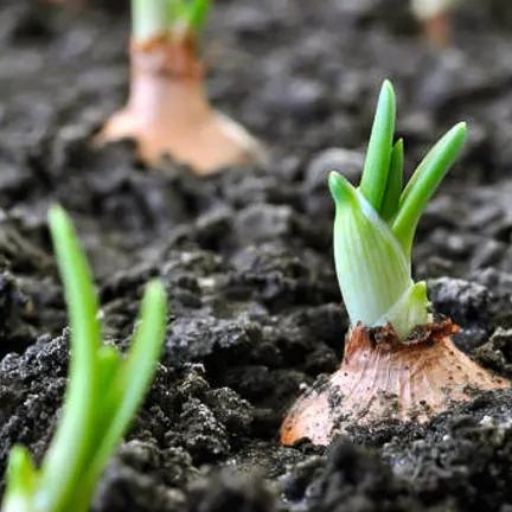
Organic Fertilizer’s Key Ingredients
For your onions, there are some ingredients you should look out for before buying any organic fertilizer. Find fertilizers that contain nitrogen, phosphorous and potassium, which are important for root growth, general plant health and formation of bulbs. Moreover, the structure of the soil can be made better by using composted manure or bone meal as a natural matter; this also provides for slow release nutrients. These trace elements such as calcium, sulfur or magnesium are necessary because of their involvement in various physiological processes within the onion plants. It is advisable to purchase a balanced combination of these three elements on your bag of fertilizer if you want healthy and tasty onions.
Comparison: Organic versus Synthetic Fertilizer for Onion Growing
When we compare organic with synthetic fertilizers in onion growing we get a number of differences between them. Organic fertilizers improves soils structure since they slowly supply nutrients to the soil through composting manure and bone meal among others thus improving root environment for healthy plants . This type of a release rate reduces chances of overfeeding as well as nutrient runoff harmful to both flora and fauna. Also they do not pose risks during handling unlike other alternatives which may cause harm to humans or beneficial soil organisms.
On the flipside, synthetically made fertilizers have precise nutrient formulations that cater for different plant requirements. They operate quickly by producing immediate results which are often cheaply available compared to most original kinds. However, their excessive application leads to soil degradation over time due to disturbance in beneficial microbial communities leading to nutrient imbalances.
Ultimately choosing between organic and synthetic fertilizers comes down to gardening philosophy, budgetary considerations as well as long term objectives with regard organic matter improvement within a given soil ecosystem. Organic one gives quick results in terms of targeted outcomes while the former supports sustainable farming practices besides contributing towards overall soil system health.
Why Your Onion Crop Benefits from Organic Fertilizers
There are several ways that organic fertilizers can benefit your onion crop. First, they improve the soil structure through addition of water retaining and aerating organic matter which is essential for growth of onions. Secondly, using organic fertilizers helps in avoiding deficiencies or spikes that result from synthetic counterparts by supplying nutrients steadily at a low pace. This helps to develop strong onion roots and promote healthy growth across the whole plant. Furthermore, these types contribute to a good microbial activity in the soil in favor of creation of a thriving ecosystem that enhances nutrient cycling and disease suppression. Finally, gardening practices become more sustainable since there are no risks of environmental pollution or chemical burn associated with using such type of fertilizers.
How to Fertilize Onions for Best Growth?
The best time for applying fertilizer during the growing season of onions
Applying fertilizer at appropriate periods during growth is essential for optimal growth and yield of onions. Initially, you need to prepare the soil by incorporating balanced slow release fertilizers into it two or three weeks before planting. This allows enough time for the soil to absorb nutrients thereby creating a nutrient rich environment necessary for young onion plants. After planting and establishment, side dress the plants with fertilizers when they attain about 6 inches in height. It normally happens at around 3-4 weeks into the growing season. Fertilizing is done every two to three weeks until bulbing occurs in onions. At this stage changeover to high potassium fertilizer which aids in bulb development and formation. Accordingly, this timeline ensures that onions have access to a regular supply of required nutrients so as to encourage their healthy growth and high yields.
How to Identify Deficiencies Using Onion Fertilizer
Detecting nutrient deficiencies in onions is simply observing symptoms exhibited by plants and then addressing them using relevant fertilizers. Nitrogen deficiency usually leads to pale green or yellow leaves and stunted growth. Application of nitrogen-rich fertilizer can therefore be used as an approach towards rectifying such a situation.Phosphorus deficiency may result in dark green or purplish leaves hence poor root formation; these symptoms can be mitigated by using phosphorus-based fertilizers.Potassium shortage displays itself through yellowing leaf edges, curled up leaves, and feeble plants.As such, provision of potassium-rich fertilizer will help alleviate these signs.Outcome: As one closely monitors these symptoms followed with adjustment of fertilizer use appropriately; optimal nutrient balance will be achieved leading to healthy onion growth.
A Step by Step Guide on How To Fertilize Onions
- Prepare the Soil: The soil should be well drained before being planted ensuring that it is rich in organic matter too.
- Initial Fertilization: Mix a balanced compound like 10-10-10 (N-P-K) at the time of planting into the soil at about 1 pound per 100 square feet. This is a basic nutrient supply for young onion plants.
- Side Dressing: Apply side dressing of fertilizer when the plants are 6 inches tall, which usually occurs around three to four weeks after planting. Use high nitrogen fertilizers such as 21-0-0 to encourage growth of more leaves.Apply this at a rate of about ½ cup per 10 feet of row, making certain that it does not get on the leaves.
- Repeat Side Dressing: Every two to three weeks keep on applying nitrogenous fertilizers that maintain strong growth. Be careful not to over-fertilize them because too much nitrogen leads to lush foliage and small bulbs.
- Bulbing Stage: Onions start bulb formation approximately after 8-10 weeks hence switch to high potassium fertilizers.Potassium helps in bulb development and should be applied at a rate of about ½ cup per 10 feet of row. Do not use high nitrogen fertilizers during this period.
- Watering and Maintenance: Consistent watering should be done throughout the growing season that involves providing an inch of water every week but no overhead watering for prevention from diseases.
- Stop Fertilizing Before Harvest: Among other things, stop adding manure or even doing any topical application like composts four weeks before you decide to harvest so as onions will mature fully until their tops fall naturally.
Ensure healthy growth and a fruitful harvest of onions by following these stages while applying the right fertilizers at every stage.
Which Types of Organic Onion Fertilizers Work Best?
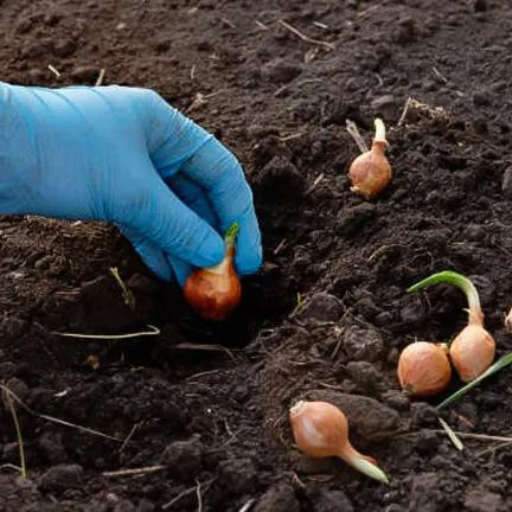
Using Onions Beds Compost and Manure
If you want to grow onions, compost and manure are two of the most potent organic fertilizers. Composts from spoiled organic materials provide soil with nutrients required for growth of the plant and its structure is also improved thus making it have a good drainage system after raining. It gives a uniform amount of nitrogen, phosphorous and potassium in relation to growing stages on onions. Furthermore, manures contain high amounts of nitrogen apart from replenishing organic matter in the soil. Add larger amounts of compost or well-rotted cow/horse manure as you prepare your onion bed about two weeks prior to planting so that necessary nutrients will be deeply rooted into the soil. Consequently, this method does not only enhance healthy growth but also sustains vigorous onion plants.
Benefits of Blood Meal and Bone Meal in Mixes That Make Fertilizer
Blood meal and bone meal are among the best organic fertilizers that can significantly increase productivity in onion farms. Blood meal supplies sufficient nitrogeneous contents that facilitate leafy development (Scott & Bhatia 12). For better bulb formation through thriving photosynthesis leading to green healthy leaves, onions need more nitrogen. Besides, blood meal helps amend soils lacking nitrate rich elements hence healthier plants.
Additionally, bone meals contain plenty phosphorus as well as calcium. Phosphorus promotes roots growth alongside being responsible for energy transfer within plants which ensures sturdy healthful root systems (Pioneer Press 78). Calcium toughen cell walls thereby fighting against diseases hence cropping becomes more sustainable over years unlike if it were not there. Inclusion of blood meals or/and bone meals in your fertilizer mixture will ensure availability all vital mineral matters; thus it will lead to a massive harvest.
Liquid Fertilizer Options for Onion Crops
Onions require quick nutrient supply using liquid fertilizers since they offer ease fitting with their daily routine life demands like watering cans. These can be applied on the soil or as a foliar spray with direct absorption by the plant. If you are to choose liquid fertilizer for your onion crop, find out those that have balanced nutrients but high in nitrogen, phosphorus and potassium (Monheim 56). Another option is organic choices such as seaweed extract and fish emulsion, which contain many micronutrients beneficial for growth and stress resistance. Also, liquid fertilizers may be formulated specifically to deal with deficits experienced by onions during their vegetative phase of development. Constant application every two or three weeks will enable them acquire some strength that results into bigger plants.
How Can I Improve Onion Growing Conditions?
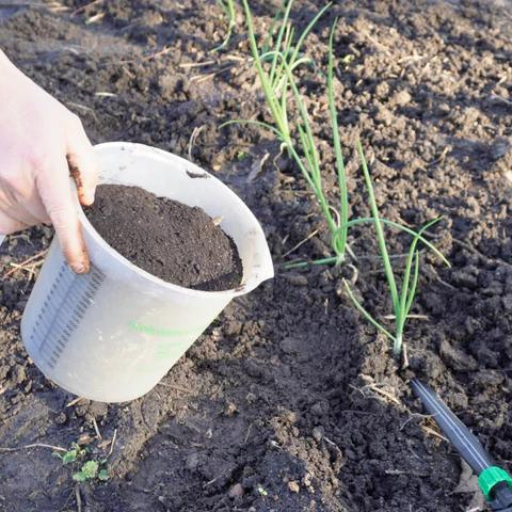
How important is soil quality and preparation for onions’ success?
For onions to grow successfully, soil quality and preparation are vital. High quality soil should be well drained, fertile and rich in organic matter. The best soils are loamy with a ph range of between 6.0-7.0. Start by testing the soil for pH levels and nutrients. Include well-rotted compost or manure to improve fertility and texture of the soil. One must plow it to a minimum depth of six inches while extracting all stones or any other thing that might hinder growth from it. Besides, maintaining uniform moisture in the soil is important because onions perform well in moist conditions only . Lastly, one can avoid disease buildup and have healthier plants by rotating crops and not planting them in the same spot each year.
Watering hints that will make your onion crop flourish
Consistent watering which is adequate is vital to promoting healthy onion growth so does watering your garden when you eat soup at lunch? These vegetables need uniformly moist ground but don’t tolerate waterlogging as this could result in bulb rotting. Apply about an inch of water per week using rainfall or irrigation on onions grown deeply into the ground-. You can use mulch around plants to keep off evaporation instead of drying out the land too much . Drip irrigation systems are particularly effective at reducing leaf wetness that promotes fungal diseases since they wet only the root area below the plant. When there are long dry periods, increase watering frequency, making sure that there’s always a bit of moisture within six inches from the surface; late evening overhead watering favors disease progress therefore should be avoided completely : By following these simple steps on how frequently to water your onions will rapidly increase their size and quantity.
Preserving Moisture And Combating Weeds By Using Mulch
Mulching is an efficient way to preserve moisture as well as control weeds in an onion garden like mine . To help maintain a uniform moisture content required for proper onion growth, application of an organic mulch between 2-4 inches thick such as straw, grass clippings or shredded leaves will greatly reduce soil evaporation. It also blocks sunlight which is necessary for germinating and flourishing weeds. When it decomposes, mulch enhances the texture of soil and increases its fertility. Spread the mulch uniformly around the plants while keeping it at least an inch away from onion bulbs to prevent rotting and pest infestation. It should be replaced on a regular basis throughout the growing season to retain its usefulness.
Can You Grow Onions in Containers Successfully?
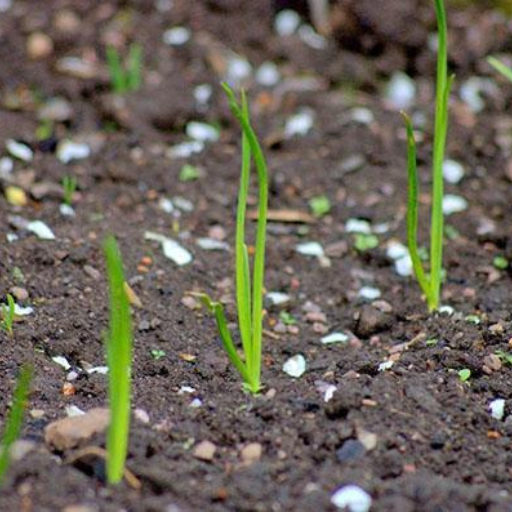
Choosing Container Size and Soil Mix
Cultivating onions in containers can be a very effective way to grow this kitchen staple, provided that you have the right container size and soil mix. A container deep enough about 10-12 inches and well-drained with good drainage holes for prevention of waterlogging is ideal for optimal growth. Depending on how many onions you want to plant, the width of the container may vary, but it is generally recommended to provide a minimum of 3-inch space between each onion.
Onion plants do best in loose, well-drained soils that are rich in organic matter. The best option is a high-quality potting mix blended with compost or well-rotted manure which enhances soil fertility. To facilitate healthy development adding balanced fertilizer might also help as an additional source of nutrients. Ensure the soil is kept consistently moist but not waterlogged so that strong bulbs may be developed by robust onions. These considerations make growing onions in pots a rewarding and successful enterprise.
Essential tips for growing onions in containers
For those people who follow these necessary instructions, growing onions using pots becomes both convenient and rewarding. First select a pot which is at least 10-12 inches deep so as to give enough room for root expansion. Good drainage should be ensured therefore get containers having proper drain holes so that water does not stagnate and decay roots.
Another important consideration is the type of soil mixture used. It should contain lots of organic matter such as compost or well rot manure mixed into high quality potting soil. This will ensure high nutritive levels within the soil to promote healthy onion growth; besides incorporation of balanced fertilizers can supply more nutrients hence enabling vigorous development.
Watering regimen must keep consistency; thus moistened all through but not drenched soils are required where strong bulbs form. To avoid excess watering and rot, regularly irrigate bulbs’ formation because too much water leads to rotting of bulbs. By providing an adequate space between each plant of not less than 3 inches, every onion is given a chance to grow without competing for nutrients.
These practical tips will enable you have a successful onion growing activity in containers and eventually have a bumper harvest.
Feeding Regimen for Container Onion Gardens
I found that from my research, a well-structured feeding regimen is essential when growing healthy onions in containers. To begin with, I apply balanced fertilizer like 10-10-10 or 14-14-14 formula at planting time to give the initial nutrient boost. Every few weeks, I also add high nitrogen fertilizer to promote leafy growth, which indirectly can cause bigger bulbs. Meanwhile compost tea or fish emulsion may be used periodically as good organic choices for feeding. The application rates on the fertilizer package should be followed strictly by me so as to avoid overfeeding and possible nutrient burn. In this way my onions will get all the required nutrients during their lifecycle resulting into a successful harvest full of yields.
Frequently Asked Questions (FAQs)
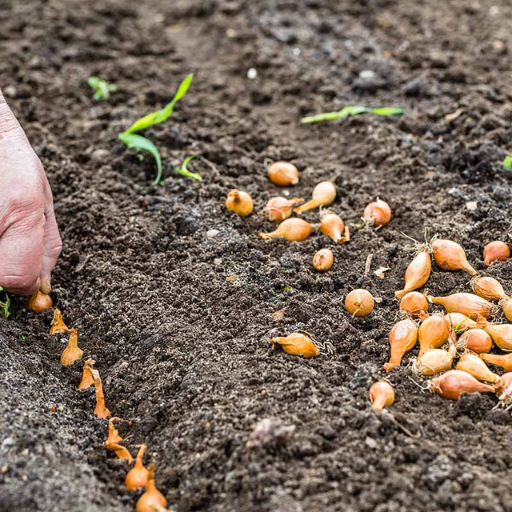
Q: What kind of fertilizer is recommended for onion seedlings?
A: Onion seedlings usually get the benefit of soluble fertilizers rich in nitrogen that aid in fast growth during the early stages.
Q: How does nitrogen fertilizer help onions?
A: Nitrogen fertilizer helps increase the number of leaves on an onion plant. The bulb will be bigger if there are more leaves on an onion plant. This makes it possible to have large onions using a high amount of nitrogen fertilizer.
Q: Can I use cover crops as a natural fertilizer for onions?
A: Yes, clover or vetch cover crops can add nitrogen and organic matter to the soil as they break down which is good for vegetables like onions.
Q: Which fertilizer type is better for a small-scale garden like Lazy Dog Farm?
A: For small gardens, granular fertilizers suitable for broadcasting evenly and releasing nutrients slowly work well. Choose one described specifically by LOYAL’s as being good so that you can apply it in little amounts over a long period to care your onions.
Q: Do organically grown onions need different fertilizers compared to conventional ones?
A: Organic fertilizers are required for organic onions. These release nutrients gradually and improve soil conditions over time; thus, ensuring your chemical-free strong onion plants.
Q: Are there specific fertilizers that work well for both onion seedlings and matured plants?
A: Yes, balanced, water soluble and high nitrogen based fertilizers will do justice to both onion seedlings as well as matured plants. This ensures that the nutrition supply remains consistent all through their growth stages.






